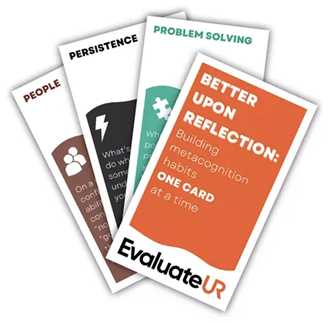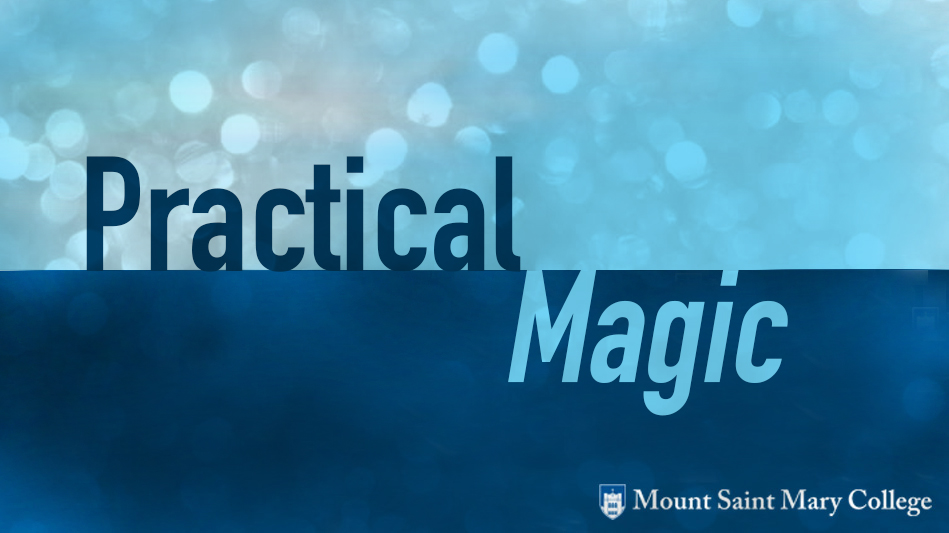| by Jennifer A. McCabe, Goucher College, jennifer.mccabe@goucher.edu |
Motivation and Background: I am a cognitive psychologist with a research program focused on metacognition and applied memory in education. I decided three years ago to structure my Cognitive Psychology course around the principles described in the book, Make It Stick: The Science of Successful Learning by Brown, Roediger, and McDaniel (2014). Many memory-improvement principles are discussed in this book, including: practice retrieving new learning from memory, space out your retrieval practice, interleave the study of different problem types, elaboration, and reflection. Other topics include the fluency illusion, getting past learning styles, and developing a growth mindset. Adopting this book as required reading, and structuring the course to reflect these principles, dovetailed with my increasing commitment to prompt and support students’ metacognitive growth. I hoped that this would both enhance student learning on objective tests (in a notoriously challenging course), and also explicitly support a course learning outcome: Improve your metacognitive skills (knowing what you know, learning how to learn).
Context in which the activity or process has been used: This has been included in three sections of Cognitive Psychology, a 200-level course offered at Goucher College, a small liberal arts institution in Baltimore, Maryland. The class size is 25-30 students, and I have been teaching this course for 13 years.
Description of activity or process methods: The description of the activity is in my Cognitive Psychology syllabus (available through Project Syllabus: http://teachpsych.org/Resources/Documents/otrp/syllabi/JM16cognitive.pdf). On the first day of class, I describe the Make It Stick” Reflection Papers. For each class period in which a chapter is assigned, students prepare and bring to class a 1-page, single-spaced reflection. Content and style is open, but they must demonstrate deep and careful thinking about the topic, and explicit connections to life experiences, habits and plans/intentions, and course material. They can also include questions and/or other personal reactions to the chapter. I note that this assignment requires elaboration and reflection, two effective learning strategies discussed in the book. Students submit 8 reflection papers during the semester (one per chapter), each worth up to 5 points. Out of a 500-point class, this assignment is worth up to 40 points (8%).
The first reflection paper is due early in the semester, typically the second week, then the subsequent seven chapters/papers are due approximately once per week. We take time in class on those days to engage in small- and large-group discussion. Most of these discussions are framed in terms of metacognition, particularly in light of research suggesting that college students do not always understand how learning works, and cannot always predict which memory strategies lead to the best retention (e.g., McCabe, 2011). I encourage them to consider their lives as learners, and how they can use information from the book to adjust their strategies.
We also talk about how this course is structured to reflect “best practice” learning strategies. For example, students take a self-graded “retrieval practice” quiz at the start of most class periods, because research shows that frequent, effortful, low-stakes, cumulative, spaced (distributed) retrieval practice: (1) produces the most durable learning; and (2) improves metacognitive accuracy of what you know. I strive to be transparent in the purpose for all course elements. In a sense, then, I see Make It Stick as a framework for the entire course – core content and topics for discussion, rationale for course design, and hopefully motivation for students to engage and feel empowered in their own learning.
Outcomes and Lessons Learned:
Since implementing this assignment, I believe that students’ knowledge about effective learning strategies has improved. They seem to enjoy the book as a required course component – on an anonymous questionnaire, 88% agreed that Make It Stick should be included in future classes. When asked whether this course had supported the learning outcome of improving metacognitive skills, 100% agreed or strongly agreed (71% strongly agreed). And when asked about one way this course has changed the way they think or behave in the world, 78% included a statement relating to metacognition. Some examples include:
“I now analyze the way I am absorbing and encoding information. I have never thought about the way I learn but now I am so grateful to accept the study strategies that work and throw away the ones that don’t.”
“It has helped me to develop a better understanding of effective study/learning strategies. Improved my metacognitive skills!”
“When I study and am overconfident in my skills, I think about metacognitive skills and test myself. This class helped me study better.”
Of course the major challenge with teaching students metacognition is that it is only half the battle to acquire knowledge about how learning works. I still struggle with motivating students to actually implement these strategies. Many are desirable difficulties (Bjork, 1994), feeling effortful and error-prone (and even frustrating) in the short term, and only showing benefits due to this initial challenge at a later time. I encourage students to use the strategies regularly, so that they become habits of mind, but I’m not convinced they consistently do so after one semester of exposure to this material. Yet the fact that they make statements such as the ones above gives me hope that they are integrating the Make It Stick ideas about metacognition into their lives.
Though this assignment has been part of a highly relevant course, Cognitive Psychology, the book Make It Stick (or selected chapters) could enhance a number of courses in and outside of psychology – as well as first-year seminars and similar courses that focus on student skill development, with the goal of teaching them how to be better learners.
References
Bjork, R. A. (1994). Memory and metamemory considerations in the training of human beings.
In J. Metcalfe & A. Shimamura (Eds.), Metacognition: Knowing about knowing (pp. 185–205). Cambridge, MA: MIT Press.
Brown, P. C., Roediger, H. L., & McDaniel, M. A. (2014). Make it stick: The science of successful learning. Cambridge, MA: The Belknap Press of Harvard University.
McCabe, J. (2011). Metacognitive awareness of learning strategies in undergraduates. Memory & Cognition, 39, 462–476. doi:10.3758/s13421-010-0035-2



